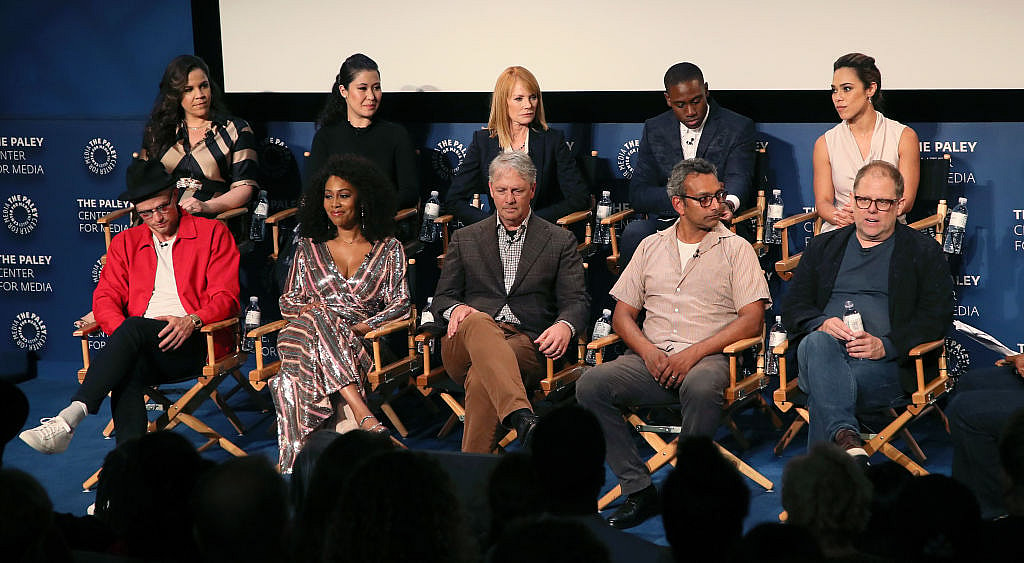All Rise is one of the few shows on network TV with a Black actress in a leading role, but writers of color have quit en masse over race and gender issues.
Read More: ‘All Rise’ star Simone Missick’s husband helped film remote season finale
Simone Missick stars as a Los Angeles judge on the sudser but five of its original writers have quit since the show premiered last fall, The New York Times reported Thursday.
Three of those who left were the highest-ranking writers of color on the serial, which was renewed for a second season in May. They say they left over disagreements with showrunner Greg Spottiswood.
All Rise is loosely based on the 2005 nonfiction book, “Courtroom 302,” which centered on a white judge. When creating the show, Spottiswood decided to cast the lead as a Black woman. But his commitment to diversity was surface level, according to those who worked with him.

“We had to do so much behind the scenes to keep these scripts from being racist and offensive,” Shernold Edwards, a Black writer whose credits include Fox’s Sleepy Hollow, told the Times.
Edwards left All Rise last November over Spottiswood’s depiction of Black characters. She says she was met with resistance each time she voiced concerns over portrayals that didn’t seem genuine.
In one instance, two characters are discussing a possible one-night stand after a woman has suffered domestic abuse the night before. The women continue the conversation even as a naked white man enters the elevator.
In another, Angelenos are terrorized with machetes by a Latino gang. Both of these scenes were altered before they aired after writers objected.
Spottiswood also dismissed the idea that a Black bailiff would discuss getting pulled over by a white cop with his coworkers. He allegedly cut the scene because “such harassment was so common that it would not merit a discussion between two Black co-workers,” the outlet reported.
“After Ms. Missick complained about the omission, saying her character would look callous if she did not acknowledge what had happened to her colleague,” the scene was rewritten.
“The fact that I’m still being asked that question tells me that there are people on the show who are incapable of writing for people of color and should not be writing for people of color,” Edwards wrote in an email to the producers of the show, sharing the exchange with NYT.
Sunil Nayar, an Indian-American television writer, has a resume that includes work on ABC’s Revenge and CBS’s CSI: Miami. He also objected to how people of color were portrayed on screen and how they were treated on set.
Nayar said that he was carrying out the duties of an executive producer but was not given the respect he deserved in the role.
“It became clear to me, when I left the show, that I was only there because I’m the brown guy,” Nayar said. “Greg hired me to be his brown guy.”

In a statement, Warner Brothers claim they conducted a thorough review of the work environment.
“We identified areas for improvement, and implemented procedures and protocols in response to the findings, which are resulting in the steps necessary to move forward with the series’ leadership in place.”
Spottiswood still has his job but acknowledged in a statement that he needed to do better. He claimed to have voluntarily sought management and leadership training.
As a result of the fallout, Warner Brothers also had a Black woman serve as his adviser.
“I acknowledge that I can have a rhetorical, professorial tone in the room, and that can be perceived by some as condescending and that I can be defensive in creative conversations and debates,” Spottiswood said.
Read More: ‘All Rise’ to resume production remotely on coronavirus-themed episode
“I remain strongly committed to improving my communication style and skills, and to being a more inclusive leader—ensuring that writers and artists are not just heard, but feel listened to, respected, safe and valued.”
Have you subscribed to theGrio’s podcast “Dear Culture”? Download our newest episodes now!


